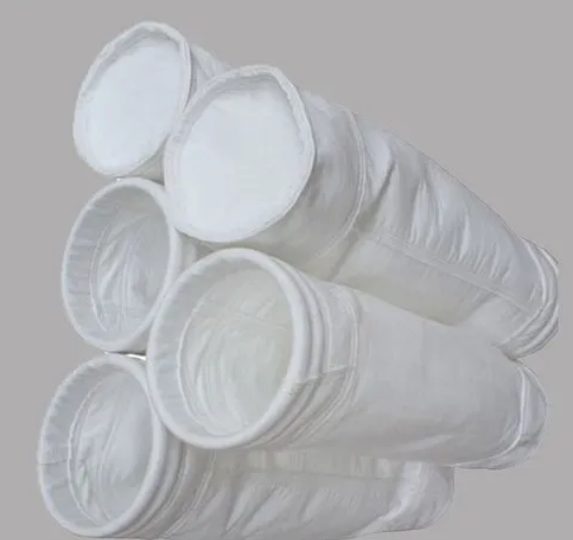
Introduction
Effective dust filtration is critical in the field of industrial operations, where environmental compliance and efficiency are top priorities. Airborne particles seriously hinder the longevity of equipment and worker health in manufacturing plants, power generation facilities, and industrial processing units. This is where the polyester filter bag is an essential tool in the fight against dust pollution.
Knowing Your Polyester Filter Bag
High temperatures, strong chemicals, and abrasive particles frequently seen in industrial environments are all conditions that polyester filter bags are designed to handle. Polyester filter bag is a popular option for many applications because of their outstanding filtration effectiveness and great durability, which are attributed to their synthetic polyester fibre composition.
Content and Organisation
Usually, we weave or needle polyester fibres into polyester filter bags to create a dense, porous fabric. Then, we shape this cloth into cylindrical bags of various sizes and shapes to accommodate specific dust collection systems. Effective filtration is ensured by the tight weave of polyester fibres, which also maintains enough airflow to avoid pressure drops and system inefficiency.
Principal attributes and advantages
Superior Filtration Performance: Polyester filter bags’ complex pore structure and electrostatic qualities enable them to be excellent at capturing fine particles, such as dust, fumes, and powders.
Chemical Resistance: Unlike natural fibres, polyester resists chemical breakdowns, ensuring the longevity of filter bags under challenging conditions.
Temperature Resistance: Because polyester filter bags are resistant to high temperatures, they are useful in applications where hot gases and thermal processes are involved.
Abrasion Resistance: Because polyester fibres are strong, they may resist abrasive particles without breaking down or wearing out too soon, prolonging the life of filter bags.
Easy Maintenance: Because polyester filter bags are simple to clean and maintain, they save money and improve operational efficiency throughout their useful lives.
Polyester Filter Bag Applications
Polyester filter bags find application in a variety of industries where dust control is crucial, such as metal smelting, food processing, pharmaceutical manufacturing, and cement manufacturing. Several typical uses are as follows:
Power Generation: Polyester filter bags are essential for collecting fly ash and other combustion byproducts in coal-fired power plants. This minimises emissions and ensures adherence to environmental regulations.
Chemical Processing: To prevent dangerous odours from escaping into the atmosphere and to protect the health of employees, chemical processing plants use polyester filter bags.
Food and Drink: Polyester filter bags are used in food processing facilities.
Pharmaceuticals: To ensure product quality and regulatory compliance, polyester filter bags assist in maintaining cleanroom conditions in pharmaceutical manufacturing facilities.
Dust Collection Systems: Increasing Effectiveness
The most effective way to protect against airborne particulates is to include polyester filter bags in larger dust filtration systems, even though they are still the first line of defence. Typically, these systems include:
Dust Collection Hoods: Placed at dust emission sites, collection hoods capture particles before they spread into the surrounding area.
Ventilation and Ductwork: A network of ventilation systems and ducts is required to transport collected dust to central collection sites to ensure airflow and prevent contamination.
Dust Gatherers: Equipped with polyester filter bags, centralised dust collectors remove particles from airstreams before releasing clean air back into the atmosphere.
Surveillance and upkeep: To guarantee optimum system performance and avoid operational disturbances, regular examination, cleaning, and replacement of filter bags are important.
Technological advancements in polyester filter bags
Polyester filter bag technology has significantly improved recently as a result of developments in materials science and manufacturing techniques. By improving efficiency, durability, and sustainability, these solutions seek to meet new difficulties in dust filtration.
Nanofiber surface coatings
The use of nanofiber coatings on polyester filter bags is one noteworthy advancement. Tens to hundreds of nanometers in diameter, nanofibers have a remarkably high surface area-to-volume ratio that enhances filtration effectiveness. Manufacturers of polyester filter bags can improve their dust collection capacity, especially for sub-micron particles, by covering the bag’s surface with nanofibers. Thanks to this development, the industry can now control air quality at higher levels while using less energy and reducing pressure.
Properties that prevent static electricity
The incorporation of antistatic qualities into polyester filter bags is another innovative field. The buildup of static electricity on filter surfaces can be dangerous in businesses where combustible dust can cause explosions, such as in the food processing, chemical, and pharmaceutical industries. Antistatic polyester filter bags specifically reduce static charges, lessen the chance of dust explosions, and improve overall safety in dangerous areas. This proactive approach to risk reduction highlights the significance of ongoing advancements in dust filtering technology.
Sustainable Production and Materials
In response to growing environmental concerns, manufacturers are using more sustainable materials and manufacturing techniques to produce polyester filter bags. While virgin polyester still has similar performance qualities, recycled polyester fibres come from post-consumer and post-industrial sources and provide a more environmentally responsible option. The production of polyester filter bags has less environmental impact because of further improvements, including waste minimization plans and energy-efficient production methods. Businesses can reduce their environmental impact without sacrificing the effectiveness of dust filtering by putting sustainability first throughout the product lifecycle.
Intelligent systems for monitoring and controlling
In polyester filter bag technology, another frontier is the integration of sophisticated monitoring and control systems. Industrial facilities can optimize maintenance schedules and spot anomalies in real time by monitoring filter performance using Internet of Things (IoT) sensors and data analytics. By spotting possible problems before they become serious, predictive maintenance algorithms can reduce downtime and increase operational effectiveness. Furthermore, by reducing maintenance procedures and guaranteeing regulatory compliance, remote monitoring capabilities allow facility managers to control several dust filtering systems from a single dashboard.
Prospective Pathways and Obstacles
In the future, we expect the polyester filter bag technology field to continue developing and innovating. However, to fully leverage these filtration methods, we must overcome a few obstacles:
The distribution of particle sizes: Polyester filter bags need to change to more effectively catch ultrafine particles as companies struggle with ever-tougher air quality regulations.
Lifecycle Evaluation: Comprehensive lifecycle evaluations are required to examine polyester filter bags’ environmental effects comprehensively, including resource consumption, emissions, and end-of-life disposal.
Personalisation and Flexibility: Sectors function in various settings with distinct dust compositions and operational demands. To effectively address the changing needs of various sectors, tailored solutions that can adjust to particular applications will be necessary.
Regulatory Compliance: To maintain continuous compliance and financial viability, polyester filter bag producers need to keep up with modifications to industry-specific rules and emission requirements as regulatory frameworks change.
Artificial intelligence-powered adaptive filtration control systems can dynamically modify their operational parameters in response to shifting These intelligent systems reduce energy consumption and operating costs while ensuring excellent dust capture efficiency through parameter optimisation, including airflow distribution. Real-time feedback loops enable rapid modifications to maintain optimal performance in a variety of load scenarios and dust compositions.
Data-Oriented Optimisation Techniques
To inform optimisation techniques, machine learning algorithms can examine past data on filter performance and process variables, and companies can optimize filtering system characteristics, such as filter bag composition, pleating arrangement, and cleaning processes, to meet specific application demands and achieve peak performance. Continuous learning and adaptation enable the constant refinement of filtration processes, resulting in efficiency gains and cost reductions over time.
Robots for Autonomous Maintenance
Emerging technology, such as autonomous maintenance robots fitted with AI-driven sensors and actuators, provides a futuristic approach to filter bag inspection and cleaning activities. These autonomous robotic devices are capable of navigating intricate industrial settings, autonomously carrying out basic maintenance chores, and examining filter bags for wear, damage, or obstructions. Autonomous robots improve operational efficiency and worker safety and save maintenance costs by automating labour-intensive maintenance tasks like filter bag replacement and cleaning.
Collaborative Projects for Research and Development
Collaboration between industrial players, academic institutions, and technology providers is necessary to enhance polyester filter bag technology through AI integration. Partnerships between the public and private sectors and collaborative research projects speed up innovation and commercialization efforts by facilitating resource sharing, information transfer, and technology transfer. Participants may be better able to tackle difficult problems and create solutions that are more widely applicable through the combination of knowledge and assets.
Applications of Dust Filter Bag: Where Do They Shine
From metalworking shops to food processing plants, the applications of Dust filter bag is diverse and far-reaching. These bags are commonly used in dust collection systems, air pollution control devices, and product recovery processes across industries such as manufacturing, mining, pharmaceuticals, and agriculture. Wherever airborne particles pose a threat to human health or product quality, dust filter bags rise to the challenge, delivering clean, safe air.
Conclusion
The importance of polyester filter bags in dust filtration cannot be overemphasised as industries work to strike a balance between environmental responsibility and production. These long-lasting filtration solutions support safer working conditions, regulatory compliance, and operational efficiency by retaining clean air quality and trapping hazardous particulates. Innovations in filter bag design and production techniques promise even higher sustainability and efficiency in the fight against pollution, as long as technology keeps improving.
Polyester filter bags are a testament to the global industry’s creativity and commitment to reducing the effects of dust pollution in pursuit of cleaner air and healthier work environments. To maintain a thriving and sustainable industrial landscape for future generations, it will be imperative that we continue to invest in cutting-edge filtering technology.
Source: Explore








